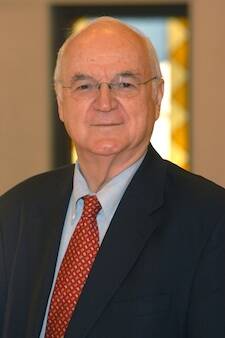Richard McBrien, R.I.P.
The late Rev. Richard P. McBrien’s outspoken manner won him a following among those devoted to the reforms of the Second Vatican Council and critics among others, who saw his views—on issues ranging from women’s ordination to the virgin birth—as erroneous or misleading.
Father McBrien taught at Boston College and served as president of the Catholic Theological Society of America. Beginning in 1966, he wrote a column for the diocesan press, although several dioceses eventually dropped it as too controversial. He described the liturgical practice of eucharistic adoration, for example, as a theological “step backward.” In 1980 the president of the University of Notre Dame, Theodore M. Hesburgh, C.S.C., brought him to South Bend to strengthen the Catholic identity of the theology department. There, Brian E. Daley, S.J., told America, he was a “team player” and an “effective leader.” Perhaps his greatest achievement was the 1,290-page, one-volume edition (1981) of Catholicism, which sold over 150,000 copies worldwide. The diocesan censor declared the book orthodox, and the local bishop recommended that readers study the book in its entirety so as to learn the difference between official teaching and theological speculation.
Martin E. Marty, a Lutheran scholar, called Father McBrien an “exemplar of the Christian life in action,” and the Notre Dame historian R. Scott Appleby said that as a leader of the U.S. church’s “moderate left wing,” Father McBrien took on those “rolling back the council.” Foes tried relentlessly to silence him. His reply was, “I don’t hold things back.” The church is richer for it.
New Grecian Formula
Beware of Greeks bearing gripes. Since the nation’s economic bailout was arranged in 2010, European central bankers, keen to dispense hard medicine to the continent’s fiscal prodigals, have been ignoring the resentment of ordinary Greeks, who have now endured years of personal and national belt-tightening. The economy has contracted by a quarter and unemployment is now over 25 percent. The country’s debt stands at an insurmountable 175 percent of G.D.P., higher than at the beginning of the crisis. In response, creditors in Europe, worried over Greek contagion, have pushed for even deeper cuts in government spending.
But average Greeks have had enough. They voted on Jan. 25 to put Alexis Tsipras and his Syriza Party in power on the promise that austerity would end, the debt burden would be lightened, and Greece would remain part of the European community. It is not clear how Mr. Tsipras can pull off that remarkable trifecta. Greece’s German creditors are holding the line on any further reduction in debt, and Mr. Tsipras is cheerfully encouraging other populist uprisings against debt in Ireland and Spain. Cooler heads might hope to prevent either a disastrous Greek exit from the European Union or a widespread unilateral repudiation of debt that would undermine long-term bond markets.
Those insisting on a “fair” payout from Greece might consider what is fair to people who are watching their futures evaporate while the creators of the crisis book suites at Davos. Prime Minister Tsipras has reminded Europe’s German overlords that a debt conference in 1953 set the stage for Germany’s remarkable revival after the war. A similar conference to face up fairly to today’s European debt emergency might prevent an outcome that all sides publicly declare they wish to avoid.
The Promise of India
President Obama was in his element as he spoke forcefully to a crowd of mostly young Indians about the ideals that bind the world’s oldest and largest democracies. Riding high after a successful round of discussions with India’s Prime Minister Narenda Modi, the president placed conditions on what he hopes will be a “defining partnership” of the 21st century. “India will succeed,” he said, “so long as it is not splintered along the lines of religious faith” and “women and girls have all the opportunities they deserve.”
Archbishop Albert D’Souza of Agra, secretary general of the Catholic Bishops’ Conference of India, was heartened by Mr. Obama’s tough-love message and said it “shows that the world is taking seriously what is happening in the country.” Prime Minister Modi is the first Hindu nationalist to lead the country, and while he ran on an economic and governance platform, his victory seems to have emboldened more militant Hindu groups. In December some of these nationalist groups conducted mass “reconversions” of Muslims and Christians. The Indian bishops have urged Mr. Modi to intervene to protect the nation’s religious minorities.
Some observers were quick to accuse President Obama of hypocrisy in cutting short his time in India in order to pay his respects to the Saudi royal family on the death of King Abdullah. The U.S. relationship with Saudi Arabia—at once our partner in the fight against the Islamic State and the chief financier of Islamic extremists—is built on contradictions, but the elevation of the new King Salman gives the president a chance to recast this difficult alliance on the same terms he spoke of so passionately in New Delhi.








